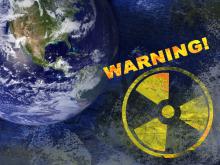Obama's outreach to CEOs does little to stem the return of the economy's bad old days.
Commentary

Renewable energy sources aren't just safer than nuclear power -- they're also cheaper.
The Utah Compact has good immigration principles -- but there's still a more excellent way.
The "people's revolutions" in North America and the Middle East raise stark questions about the U.S. role in the region.
New software may help the public have a greater voice in the crucial redrawing of voting districts.
We can't avoid the tough questions on how to change the culture in which we all participate.
A technique for natural gas drilling threatens drinking water and the environment.
Finally, reparations for past federal mistreatment of American Indians and African-American farmers move forward.
Even before last fall's reboot of the peace process, Israeli and Palestinian headlines recycled variations on the theme, "What will happen when the talks fail?" Official spokespersons dutifully countered with optimistic clichés. But as the process drags along, on-the-ground skepticism remains.
West Bank Christian Daher Nasser expresses a widespread grassroots opinion: Governments don’t make peace, people do. Though surrounding Israeli settlements threaten to confiscate his family's land, he has invited Orthodox Jews from those same settlements for tea and sponsored soccer games between Palestinian and Israeli children. A stone at the farm’s entrance bears the painted slogan, "We refuse to be enemies," even though Israelis have bulldozed hundreds of his olive trees. His response? Plant hundreds more.
But can isolated acts of nonviolence create lasting peace? After an East Jerusalem screening of the documentary film Budrus, one of the producers, Rula Salameh, acknowledged that localized successes of Palestinian nonviolence have yet to coalesce into a comprehensive, disciplined movement. Though demonstrations have been successful at altering the path of the Israeli "separation barrier," sometimes organizers cannot prevent youths from throwing stones. Salameh and others confirm that many older Palestinians who've "paid the price" for participating in past violence admit that such methods harmed all sides, and that nonviolence is a better way.
Rev. Kobia: The international community, including churches, has a very important role to play to make sure that the 2005 Comprehensive Peace Agreement between North and South Sudan -- including the Jan. 9, 2011, Southern independence referendum -- is implemented in full. It is important for international churches to accompany Sudan’s churches to help with civic and voter education, and to help the churches be able to monitor the elections.
There is no question that the results of the referendum will be disputed: The North will not accept the South as separate, the South will not accept any result that does not give them separation. Currently, there are no clear mechanisms on how to resolve that; we are putting this to international actors.
We also have no less than half a million internally displaced persons, Southerners living near Khartoum. These people could easily be rounded up -- and even massacred. They also are being intimidated; they might not be able to exercise their right to vote.
Finally, we are seeing hot spots: Abyei, Southern Kordofan, the Nuba Mountains, and Blue Nile. Even if the North and the South separate peacefully with the referendum, these hot spots could be the sparks causing violence to start again.
When we contemplate what is likely to happen if the referendum does not take place on Jan. 9, we tremble. Because should there be another war, it will be more bloody and widespread than even the previous two; the Southern Sudan People's Liberation Army is better prepared. We pray this does not happen.
Back in the Clinton era, Congress and regulators shredded many of the ground rules that had been keeping our financial system working safely since the Great Depression. The people making the big money (and creating the toxic assets) set themselves and their cronies up as the "experts" and told the rest of us not to worry our pretty little heads about it.
The crash of 2008 made it painfully clear it was time to stop letting Wall Street make up the rules. Last June, Congress passed, and President Obama signed into law, the Dodd-Frank Wall Street Reform and Consumer Protection Act. In addition to creating the much-needed Consumer Financial Protection Bureau, the act contains reforms that can head off future crashes. But, to put that law into action, various agencies have to write ground-level regulations and definitions.
How these rules get written can make Dodd-Frank either an effective, strong law or—if Wall Street’s swarm of lobbyists gets its way—a washed-out shell. "The number of people that have come in requesting to be exempt from the law, or to have the law delayed, has literally shocked me," a Commodity Futures Trading Commission official told Bloomberg News.
If the love of money is the root of all evil, let's just say the devil is trying to get into the details.